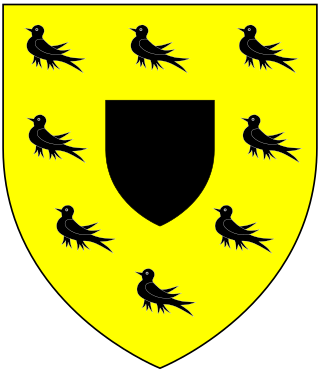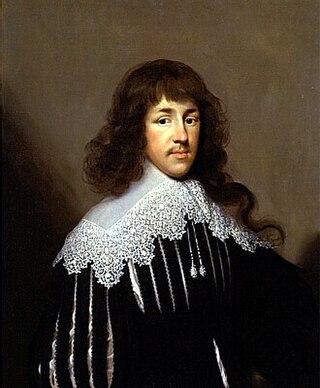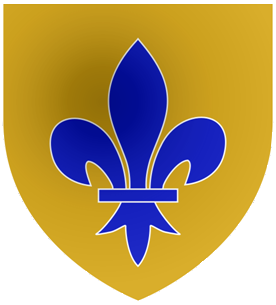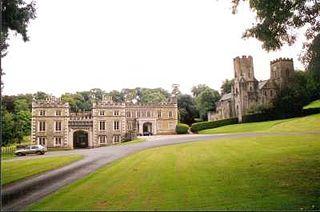Related Research Articles

Richard Onslow, 1st Baron Onslow PC, known as Sir Richard Onslow, 2nd Baronet from 1688 until 1716, was a British Whig politician who sat in the English and British House of Commons from 1679 to 1715. He was Speaker of the House of Commons from 1708 to 1710 and Chancellor of the Exchequer from 1714 to 1715. Onslow was a very unpopular figure amongst members of both political parties, particularly during his time as Speaker. He was extremely pedantic and showed an absolute devotion to principle, as a result, he was given the nickname "Stiff Dick".
John Leyburn was an English Catholic prelate who served as Vicar Apostolic of England from 1685 to 1688 and as Vicar Apostolic of the London District from 1688 to 1702. He was not only a theologian but also a mathematician and an intimate friend of René Descartes and Thomas Hobbes.
There have been ten baronetcies created for persons with the surname Browne, six in the Baronetage of Great Britain, three in the Baronetage of Ireland and one in the Baronetage of Nova Scotia. Only one creation is extant as of 2010. Three of the creations were for members of the Browne family headed by the Viscount Montagu.

Sir William Blackett, 1st Baronet was a landowner and politician who sat in the House of Commons in three periods between 1685 and 1705.

Sir John Brownlow, 3rd Baronet of Belton House near Grantham in Lincolnshire, was an English member of parliament. He built the grand mansion of Belton House, which survives today.
Sir Arthur Gore, 2nd Baronet was an Irish politician and baronet.
Sir Roger Cave, 2nd Baronet was an English politician and baronet.

Sir Francis Godolphin MP, of Godolphin in Cornwall, was an English nobleman, landowner, politician, and Member of Parliament. His chief claim to fame is that he was the dedicatee of Hobbes' Leviathan.
Robert Bulkeley, 2nd Viscount Bulkeley of Cashel was a British peer and politician.
Sir William Honywood, 2nd Baronet was an English politician who sat in the House of Commons from 1685 to 1695.

Sir Stephen Lennard, 2nd Baronet of Wickham Court, West Wickham, Kent was an English landowner and Whig politician who sat in the House of Commons of England in two periods between 1681 and 1701 and in the House of Commons of Great Britain from 1708 to 1709.
John Beaumont was an English soldier at the time of the Glorious Revolution and politician who sat in the House of Commons between 1685 and 1695.
Caleb Banks was an English politician who sat in the House of Commons between 1685 and 1696.
Sir Edward Hales, 3rd Baronet was an English politician who sat in the House of Commons of England from 1679 to 1681. He became a Catholic and supported King James II at the time of the Glorious Revolution.

Sir William Portman, 6th Baronet FRS was an English politician who sat in the House of Commons between 1661 and 1690.
Sir John Duke, 2nd Baronet was an English politician who sat in the House of Commons variously between 1679 and 1698.
Sir Adam Browne, 2nd Baronet, DL, JP was an English politician who sat in the House of Commons in two periods between 1661 and 1689. He fought in the Royalist army in the English Civil War.

John Eliot of Port Eliot, St Germans, Cornwall was an English politician who sat in the House of Commons in 1640 and from 1660 to 1685.
John Clayton was an English politician who sat in the House of Commons in 1659 and 1660. He fought in the Parliamentary army in the English Civil War.
Sir Edward Evelyn, 1st Baronet DL was an English Tory Member of Parliament who served in a number of local offices in Surrey and found favour under James II of England. Removed from several local offices at the close of the latter's reign, he was largely replaced in them by William III and Mary II and appointed a gentleman of the privy chamber. He died a few years later, dividing his property among the three daughters who survived him.
References
- ↑ Leigh Rayment gives day of burial as day of death
- 1 2 John Burke A genealogical and heraldic history of the commoners of Great Britain
- 1 2 3 Basil Browne Henning The House of Commons, 1660-1690, Volume 1
- ↑ Leigh Rayment's Historical List of MPs – Constituencies beginning with "B" (part 3)